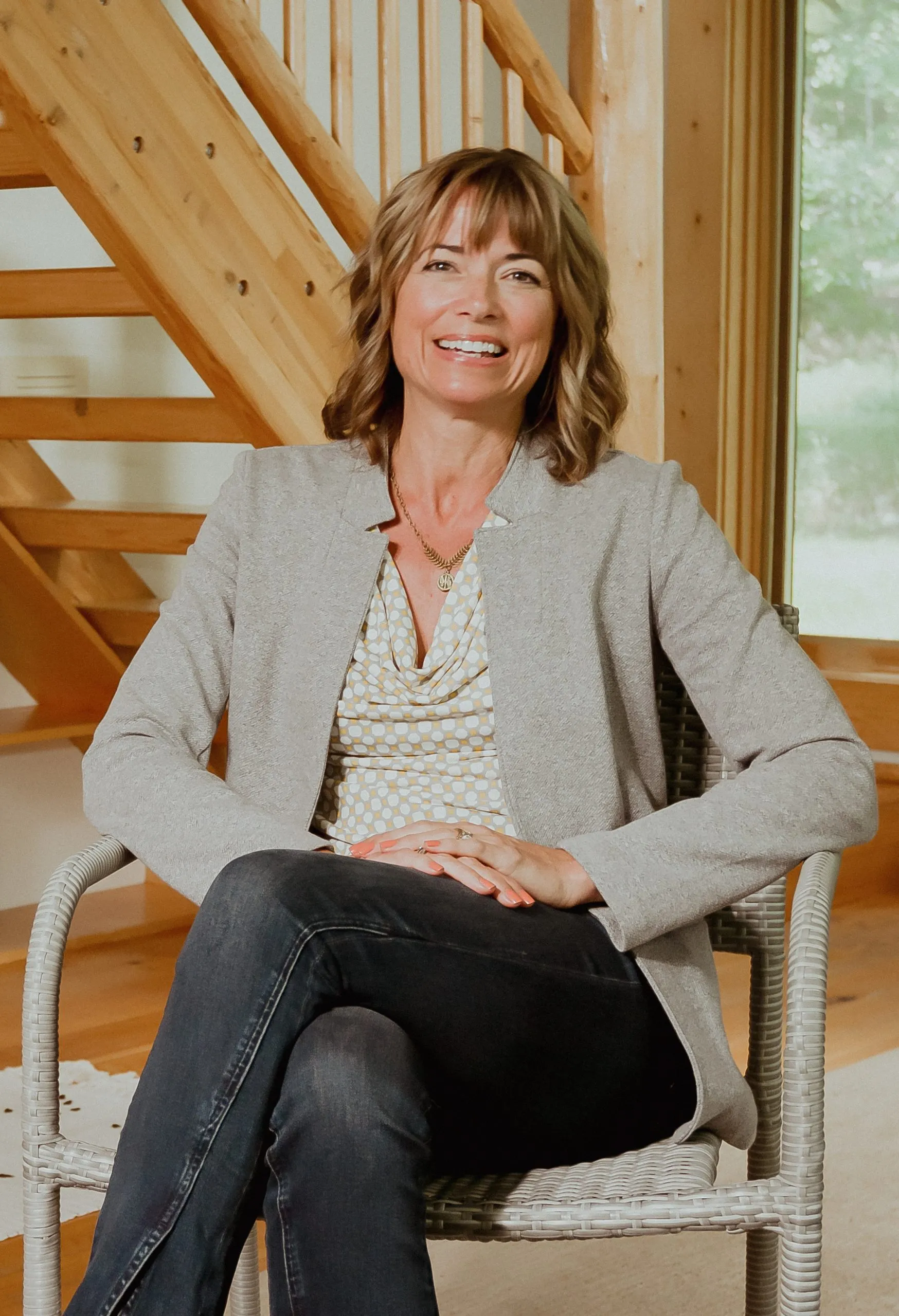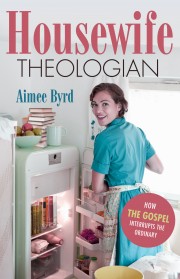Books At a Glance (Fred Zaspel):
How does the title Housewife Theologian sum up what you are trying to get across in your book?
Aimee Byrd:
One of the main premises that I am trying to communicate in my book is that every married woman is a housewife, and every person is a theologian. Whether women have occupations outside of the home or not, we all share in our responsibilities to the culture of the home. So I identify the basic definition of a housewife as a married woman, the woman of the home. Even so, the book was also written with single women and widows in mind. I see my own vocation as a housewife theologian, and that is the platform from which I speak.
As for theologian, we are all responsible to know God, and that is what theology is. In John 17:3 we see Jesus praying, “And this is eternal life, that they know you the only true God, and Jesus Christ whom you have sent” (emphasis mine). Theology is an eternal matter! We are all theologians of some sort, so the question is whether we are good ones or bad ones.
We are all theologians of some sort, so the question is whether we are good ones or bad ones.
Books At a Glance:
Please tell us something about yourself, your background, and/or your current setting. What factors played into your interest to study this subject?
Aimee Byrd:
Well, I am a happily married housewife in Martinsburg, WV. My husband, Matt, and I am trying to keep up with parenting three children, ages 8-14. At this stage in my life, I am wondering how the years got ahead of me so quickly and deliberating about this strange juncture where my social life revolves so much around my children’s. We lived in Frederick, MD for the first seven of our marriage. That is the town where I grew up. I owned a coffee café for a few years in the beginning of our marriage, so I have masterful barista skills; and even now I have coffee mugs hanging from the ceiling in my breakfast, a.k.a. “coffee” room. When we made our move to WV a little over 9 years ago, I found myself wrestling to have meaningful conversations with the new friends that I had been making. I realized that while many women have the moral imperatives of the Christian life down pretty good, they are lacking the theological indicatives behind them. This book is an attempt to provide a tool for women to examine how the gospel interrupts the ordinary.

Books At a Glance: Tell us how you intend women to use your book.
Aimee Byrd:
While I believe Housewife Theologian will be beneficial to those who read it individually, I have designed it to be a book that you can journal through and discuss in a small group or workshop setting. There are twelve chapters so that you can do a monthly study in one year. The journaling questions at the end of each chapter serve as the discussion topics for the group. My goal is that women in their local church communities can grow closer as they encourage one another in their successes and their failures in trying to live faithfully to the gospel proclamation.
Books At a Glance:
Have you been acquainted with women who model the ideal you are advancing in this book? How have they affected you or influenced your thinking in this regard?
Aimee Byrd:
I am surrounded by a wonderful group of older women in my church. We meet every Tuesday morning to study God’s Word together. These women have helped me to better understand how God is faithful through the ordinary means of grace that he has provided in the local church setting. I am also blessed to have a mother, sister, and friends who are bad at small talking. I can always count on them for stimulating theological conversation. But all of us have many struggles in our everyday lives. I hope that my book will facilitate opportunities to realize how our theology shapes the way we handle both the mundane activities and the trials that we face.
Books At a Glance:
How has the community of the church had an impact on your growth as a “housewife theologian”? What are some of the dangers of women cutting themselves off from the church community?
Aimee Byrd:
The church community is the body of Christ. Cutting ourselves off from that would remove us from the very place God has promised to bless us in Christ. Sitting under the preached Word of God, receiving his sacraments, and serving with fellow believers is holy activity that we are called to do. In it, we realize that we have been called out from our daily work to receive. Women can get very busy doing what I call “running the world” throughout the week. I need to be reminded of the gospel, to sit under the very Word that affects change in my heart. Here I see that I am cast into God’s divine drama, not the other way around. My thinking is interrupted by the reality of an eschatological kingdom that is breaking in. This has everything to do with my growth and impact as a housewife theologian.
Books At a Glance:
How would you encourage women to see their often unseen and unsung work in the home as something of great and lasting value?
Aimee Byrd:
Good question. God doesn’t call us to give him our best and display our “gospel work” for everyone to see. He bids us to give him everything. Although we may feel as insignificant as the widow in Luke 21:1-4 who gave a mere two pence, we see that Christ noticed her and accepted her offering—which was all that she had. God has providentially placed us in the very context in which we are called to serve. I get it, sometimes our work just makes us frustrated and tired. But we can give abundantly to the Lord by faithfully honoring him where he has called us because he has lavishly given us the righteousness of Christ. We all have a huge circle of influence to show Christ to others, no matter what our job is. And we can be confident that Christ is blessing our efforts with eternal value.
Books At a Glance:
You define femininity in terms of receiving and note that this “sounds an awful lot like victimhood.” Why do you think this concept best explains the essence of femininity while avoiding the possible “doormat” connotations?
In Ephesians 5 we learn that marriage is a picture of Christ’s love for his church. In this way, we see that a woman’s femininity may show forth the gospel message in how Christ’s bride is a receiver of his grace.
Aimee Byrd:
I quote Elisabeth Elliot in my book, explaining how Mary modeled femininity to us when she received what the Lord has given her, unlike Eve who insisted on getting what she shouldn’t have. This is not a passive approach to life, but rather flourishing properly in the way that we have been design to reflect the image of God. As bearers of his image, women have dignity. In Ephesians 5 we learn that marriage is a picture of Christ’s love for his church. In this way, we see that a woman’s femininity may show forth the gospel message in how Christ’s bride is a receiver of his grace. But the church is no doormat. My conviction is that if we really believe that women and men have complementary roles, then we should be very concerned to equip women to be strong, theological thinkers so that our submission is to the Lord above all.
Books At a Glance:
You talk a good bit about the “cultural mandate” in the final few chapters of your book. How would you describe a Christian’s responsibility generally and woman’s responsibility more specifically toward the cultural mandate?
Aimee Byrd:
It’s difficult to sum up those chapters in a brief answer, but I will try. The cultural mandate is given in Gen. 1:27-28, where God tells Adam to expand his kingdom by being fruitful, to subdue creation, and exercise dominion over every living thing that he has created. Here we see our great task to be creators of community and culture. Where the first Adam failed to expand the garden-temple, the second Adam, Jesus Christ, is victorious. God reinstated the cultural mandate in his covenant with Noah. But since the fall, we no longer worship in the garden because the fallen world isn’t holy—it is common. Therefore, we share our cultural tasks in common with the unbeliever. We serve alongside all people even as we know that a Christian works with an eternal perspective. We go out into the world, where God operates by his common grace to sustain and preserve, as salt and light.
Women have unique challenges in our cultural participation under God’s providential rule.
As the second Adam, Jesus is expanding God’s presence and fulfilling the spiritual element of the cultural mandate. Through the church, Christ is enlarging God’s presence on earth. Chrstians are blessed to participate in this through our union with Christ as we have direct access to God and proclaim the good news of his work to others. As God is redeeming a people for himself, his church is blessed under his redemptive rule.
Women have unique challenges in our cultural participation under God’s providential rule. I discus how we can be good stewards in the place God has put us, being obedient to the Noahic covenant and faithful witnesses to the kingdom that Jesus is establishing. Women also have some special privileges that enable us to give that taste of Christianity to the watching world.
Books At a Glance:
Thank you … for your good work and for taking the time to speak to our readers!
Aimee Byrd:
What a pleasure it is to be a part of this great new website! Thanks for having me, and I am eager to be introduced to more books through your work.

